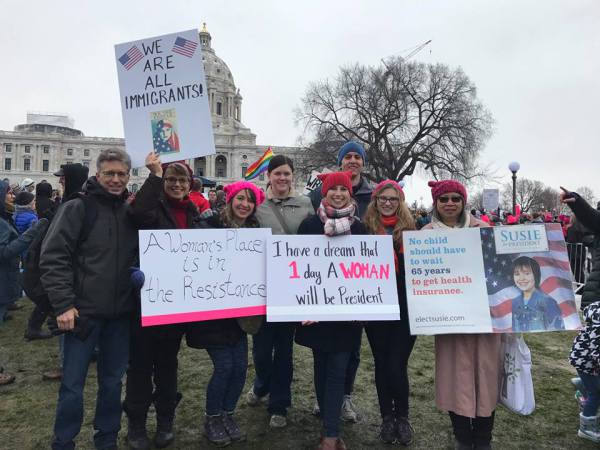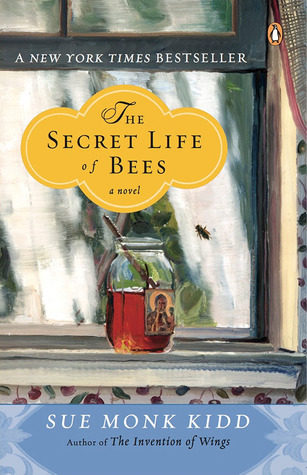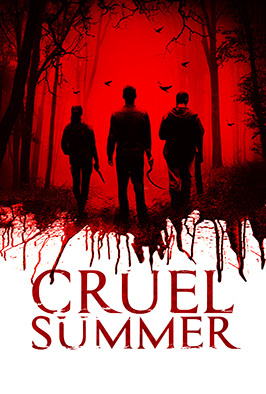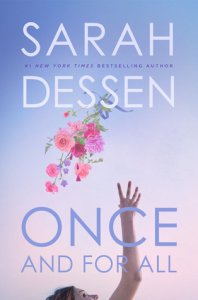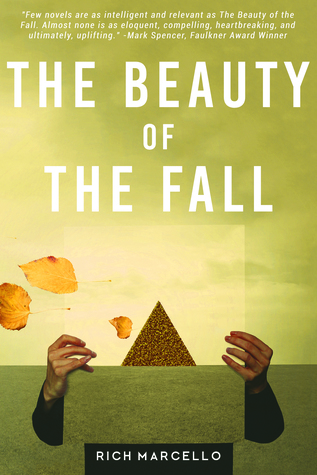A week ago I went to Roxane Gay’s reading at Skylight Books with a friend of mine from high school. Jean and I were in Writers Club together, but we hadn’t seen each other since graduation. Now that we both live in LA, we’d been meaning to meet up, and Jean suggested going to see Roxane Gay. I’d wanted to visit Skylight Books for a long time too, so I decided to seize the opportunity.
While familiar with Roxane Gay, I hadn’t read any of her books, just some of her essays in the New York Times. Last week she was reading from her new collection of short stories, Difficult Women. On that rainy evening, Jean and I arrived at the bookstore within minutes of each other to find it already very crowded. We couldn’t move very far beyond the entrance, and we were squished in the standing room up against the checkout counter. I slithered my way over to the part of the counter where I could purchase a copy of Difficult Women, noticing as I waited the signed and numbered prints by Yumi Sakugawa commemorating the 20th anniversary of Skylight Books. Then I had an extraordinary experience.
I’d thought the bookseller behind the counter looked like a writer I’d seen at the Bushwick Book Club reading/concert at Alias Books in November. Isabelle had invited me to that reading, which was two days after the election, and one of the authors was a young man who’d had a bottle explode on him before it was his turn to read. We’d really enjoyed his story. When I saw the bookseller, I thought it didn’t seem that unlikely that that writer also worked at Skylight Books. So as I was paying for Difficult Women, I asked him if I could ask him his name, and when he said it was Beau, I was triumphant. (He thought I looked familiar too. A lot of people find I look familiar.) “I saw you read at Alias Books back in November, right after the election!” I said. “My friend and I really liked your story!” I said that twice, actually. And then he and another bookseller started talking about how Alias Books was closing. (Alas, it is, and the building is being demolished! I stopped in during their closing sale last week and picked up a boxed and illustrated edition of Possession and Scandinavian Folk Dances and Tunes.)
Roxane Gay appeared at last and read from her short story collection. There followed a wonderful Q & A, during which she talked about growing up Haitian-American and dual consciousness, academia, body diversity in comics, and more. She also fielded the perennial (inevitable?) question about writing the other (i.e. a white woman asked her for advice on writing black women). Afterward, Jean and I went through the signing line, so I’ve met Roxane Gay! Even if I had nothing intelligent to say to her.
On Saturday, I chose to bring Difficult Women along to read during my journey to the Women’s March in downtown LA. It felt fitting. Plan A was to take the Expo Line train, but in the morning when I walked to the station, even after bypassing the massive line for fares, I found the platform packed. Pink hats and signs abounded. It felt good seeing so many people turning out with the common goal of taking the train to the march, but it also looked like the Expo Line wasn’t going to be able to handle the throngs. Indeed, an eastbound train rumbled into the station, and through the windows I could see it was already stuffed. The doors opened, but there was no room. I texted the fellow linguists I’d been planning to meet a few stations east to say I was giving up on the train. Instead, I took a bus to Wilshire Blvd and there caught a 720 bus headed downtown. Fortuitously enough, the same friends I’d intended to meet on the train wound up on this bus much later, as did two friends from church, one of whom gave me a pink sign she’d made that read, “Women’s rights are human rights! -Hillary”.
Before my friends boarded my bus, a man who apparently took this bus more often than most of us got on and said conversationally, “What are all you people doing on my bus?” He sat down in front opposite two women who told him they were going to the march, and he said, “Only white women go to that.” From the people on that bus alone, this was demonstrably not true (though there’s certainly a discussion to be had about race and the Women’s March). He kept talking to them, but I tuned out (to read Difficult Women).
The bus disgorged us near 6th and Flower, and we joined the crowds filling the streets. Eventually, it became clear which way the march was going, and we walked from Pershing Square to City Hall. From the reports I’ve heard, there were between 500,000 and 750,000 people at the LA Women’s March. It was heartening and inspiring. There were dozens and dozens of fantastic signs, but here are a few I made a note of:
- צדק צדק תרדף Justice, justice shall you pursue (I learned this bit of scripture by reading Davita’s Harp, one of my favorite books)
- Pro-choice, pro-cats, pro-feminism
- Queer the fight!
I also saw a lot of THE FUTURE IS FEMALE shirts, including on a whole family with two small children. And I saw a 101-year-old (immigrant?) woman in a wheelchair, carrying a sign (which explained, among other things, that she was 101!).
Then there were the chants:
- Education, not deportation!
- No Trump, no KKK, no fascist USA!
- Men: Their body, their choice! Women: My body, my choice!
- The people united will never be divided! (I like “defeated” myself, but anyways.) El pueblo unido jamás será vencido!
- Sí, se puede!
- No justice, no peace!
On our walk away from the rallies to catch the 720 back to the Westside, we passed the Last Bookstore and the Los Angeles Public Library.
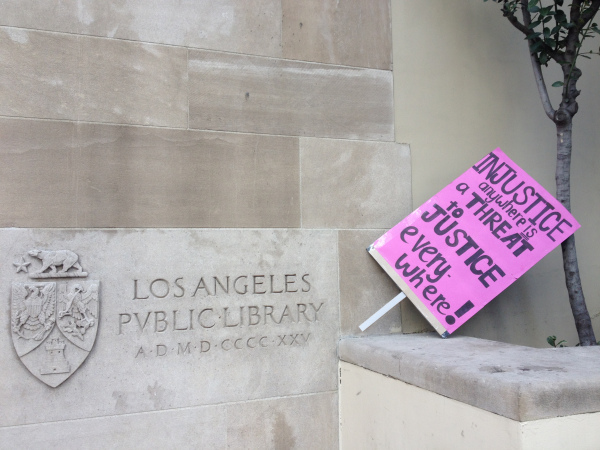
And here is my mother and several of my high school friends (with family) at the Minnesota State Capitol:
